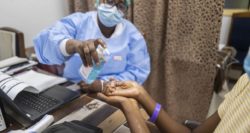How Senegal overcame global health inequality in the Covid pandemic

Source: afro.who.int
By Samuel Smith
Health inequality is one of the most distinct and prevalent forms of injustice in the 21st century. Article 25 of the Universal Declaration of Human Rights legitimises the right to health and well-being, including access to medical care, as a human right. But whilst many of us are able to enjoy the benefits of free healthcare, online health information, and health and leisure centres, this is a privilege that is by no means shared the world over. The Covid-19 pandemic has not only highlighted the massive health inequalities across the world, but also indicated the key factors which accommodate and induce a growing chasm between the worlds richest and the worlds poorest in dealing with a global health crisis.
Senegal sits in 151st place in the worlds GDP per capita rankings, 125 places behind the United Kingdom in 26th place. And yet, whilst the NHS continues to creak under the astronomical weight of Covid hospitalisations, Senegal has managed to successfully limit the spread of coronavirus amongst its population, and limit the pressure placed on its empirically weaker health care system. This has been achieved through a much better-defined policy towards coronavirus in every aspect. From testing to treating, from isolating to mask wearing, Senegal has excelled in proving that the quality of organisation is often far more important than the quantity of resources available.
Practically, the lack of resources was always going to be Senegal’s greatest obstacle. With only 9 medical doctors per 100,000 people (compared to 582 in the UK), it was clear that a widespread outbreak would paralyse the Senegalese healthcare system. For this reason, it became imperative that the spread was stopped before it had begun – herd immunity was never an option. Instead, Senegal invested in a widespread testing system, providing 48-hour results to citizens across all 14 of Senegal’s far-flung regions. Masks became mandatory in all public spaces – including outdoors, travel between regions was banned, and a national dusk-to-dawn curfew was in place for the first few months of the pandemic. As a result, by the start of 2021, Senegal had only counted 402 deaths from coronavirus. By the same point, the UK had already counted 74,235 deaths.
In Senegal, there are only 3 hospital beds per 10,000 people. This pales in comparison to the 25 per 10,000 people seen in the UK. Nevertheless, as soon as the first case was detected in Senegal, every single person who tested positive, even those who were asymptomatic, were provided with a hospital bed so they could isolate away from their families and drastically reduce the chances of Covid spreading from the very outset. Although it may seem counterintuitive, by promising their limited hospital beds to those in need of a place to quarantine, Senegal was able to reduce the spread to such an extent that these very same beds are now free to treat non-Covid patients.
Having effective government policy is only half the battle. The other half consists of spreading the news and ensuring compliance. Another key issue that the Senegalese had to tackle was the lack of internet penetration throughout the country. With only 46% of the population having access to the internet, it was far more difficult to spread the news of any new measures brought in to prevent the spread of Covid-19. But by utilising the widespread religious framework, Senegal was able to mobilise local communities to not only follow the rules, but to self-regulate and act self-sacrificially to protect the wider community.
96% of Senegal is Muslim. As a result, local Imams were able to pull communities together, rallying them behind the national calls to limit the spread of Covid, even when this meant curfews, school closures, and public gathering bans. Restrictions were upheld by a cooperative population out of respect for local religious leaders, national legislation and a sense of national responsibility for one’s neighbour.
Of course, there is always the argument that the difference in Covid rates between Senegal and the United Kingdom is to a greater extent the result of population density, an ageing population, and more widespread travel infrastructure, but this should take absolutely nothing away from the fact that a little discussed nation on the West coast of Africa has successfully navigated the greatest health crisis of the 21st century with next to no resources, upholding the right to health, well-being and medical care for their citizens. Perhaps it is time we took notice of countries like Senegal and realise that we have a lot to learn from them.
Samuel Smith - 4th year BA French and Politics
